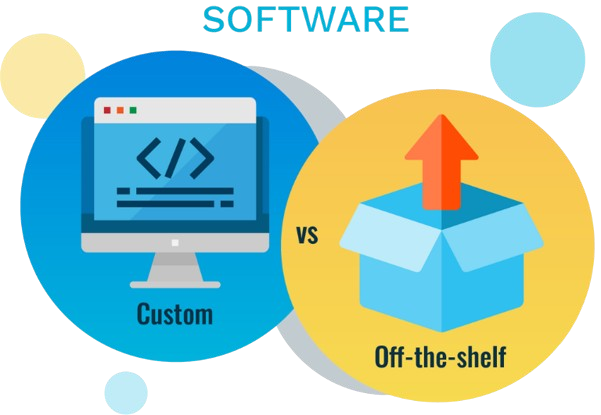In the ever-evolving world of business technology, companies often face a critical decision when it comes to software solutions: should they opt for custom web applications or choose off-the-shelf software? Each option has its own set of advantages and disadvantages, and the best choice depends on the unique needs and goals of the business. This article explores the pros and cons of both custom web applications and off-the-shelf software to help businesses make an informed decision.
Custom Web Applications
Pros
Tailored Solutions
Custom web applications are designed specifically for a business’s unique requirements. This means that every feature and functionality is aligned with the company’s operational goals, leading to higher efficiency and effectiveness.
Seamless Integration
Custom applications can be easily integrated with existing systems and technologies, ensuring a smooth workflow without the need for extensive modifications. This integration can enhance data consolidation and streamline operations.
Enhanced Security
Custom web applications offer robust security features tailored to the business’s specific needs. This includes multi-factor authentication, data encryption, and regular security audits, which help protect sensitive data and maintain customer trust.
Scalability and Flexibility
Custom applications are inherently scalable and flexible, allowing businesses to add new features and functionalities as they grow. This scalability ensures that the application can evolve with the business, providing long-term value.
Competitive Advantage
A custom application can provide a competitive edge by offering unique features and capabilities that off-the-shelf solutions cannot match. This differentiation can be crucial in standing out in a crowded market.
Cons
Higher Initial Cost
The development of custom web applications often requires a significant initial investment. This can be a barrier for small businesses or startups with limited budgets.
Longer Development Time
Creating a custom application from scratch takes time. The development process can be lengthy, requiring careful planning, design, and testing before the application is ready for deployment.
Maintenance and Updates
Custom applications require ongoing maintenance and updates to ensure they remain secure and functional. This can involve additional costs and resources, including hiring dedicated IT staff or outsourcing to a development team.
Off-the-Shelf Software
Pros
Lower Initial Cost
Off-the-shelf software is generally more affordable upfront compared to custom solutions. This makes it an attractive option for businesses with limited budgets or those looking for a quick and cost-effective solution.
Immediate Availability
Off-the-shelf software is ready to use immediately upon purchase. This means businesses can start benefiting from the software’s features without the wait associated with custom development.
Proven Reliability
Commercial off-the-shelf (COTS) software is typically well-tested and widely used. This means it has a track record of reliability and performance, which can provide peace of mind for businesses.
Regular Updates and Support
Vendors of off-the-shelf software often provide regular updates, bug fixes, and customer support. This ensures that the software remains up-to-date and functional without requiring significant effort from the business.
Cons
Limited Customization
Off-the-shelf software is designed to meet the needs of a broad audience, which means it may not fully align with a business’s specific requirements. This can result in inefficiencies or the need for additional tools to fill the gaps.
Integration Challenges
Integrating off-the-shelf software with existing systems can be challenging and may require additional modifications. This can lead to increased complexity and potential disruptions in workflow.
Security Concerns
Since off-the-shelf software is widely used, it can be a target for cyberattacks. Businesses must rely on the vendor to provide timely security updates and patches, which may not always align with the company’s security needs.
Lack of Competitive Differentiation
Using the same software as competitors can limit a business’s ability to differentiate itself in the market. Custom features that provide a competitive edge are often not available with off-the-shelf solutions. Choosing between custom web applications and off-the-shelf software is a critical decision that depends on a business’s unique needs, goals, and resources. Custom web applications offer tailored solutions, seamless integration, enhanced security, and scalability, but come with higher initial costs and longer development times. On the other hand, off-the-shelf software provides affordability, immediate availability, proven reliability, and regular updates, but may lack customization, pose integration challenges, and offer limited security features. Ultimately, businesses must carefully evaluate their specific requirements, budget, and long-term goals to make the right choice. For some, the bespoke nature of custom web applications may provide the competitive edge needed to thrive, while others may find that the convenience and cost-effectiveness of off-the-shelf software better align with their operational needs. By understanding the pros and cons of each option, businesses can make an informed decision that supports their growth and success.




